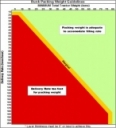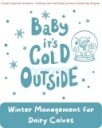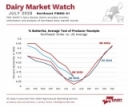Dairy
 Dairy is the leading agricultural industry in New York State, and the state ranks third in the country for milk production. Our five counties in southwestern New York form an especially vibrant dairy region, with over 680 dairy farms of many different sizes and production systems.
Dairy is the leading agricultural industry in New York State, and the state ranks third in the country for milk production. Our five counties in southwestern New York form an especially vibrant dairy region, with over 680 dairy farms of many different sizes and production systems. Relevant Events
Boots in the Barn: Cornell Dairy Research Updates
January 13, 2026
January 20, 2026
January 27, 2026
February 3, 2026
February 10, 2026
February 17, 2026
February 24, 2026
New York Certified Organic (NYCO) Field Crops and Dairy Meeting
February 10, 2026
Geneva, NY
Feed Quality Doesn't Stop at the Chopper
Katelyn Miller, Field Crops and Forage Specialist
Southwest New York Dairy, Livestock and Field Crops Program

Feed costs represent approximately 50% of operating expenses on dairy farms, with large investments in home-grown forages. It cannot be denied that there are many factors that impact our ability to harvest quality forages, both within and outside of our control, but the job isn't done once it runs through the chopper. The same prioritization of management and resources should also be allocated to maintaining quality as it enters storage.
What You Need to Know about the USDA's Farmer Bridge Assistance Program
Kate McDonald Polakiewicz, Farm Business Management
Southwest New York Dairy, Livestock and Field Crops Program
The US Department of Agriculture's Farmer Bridge Assistance (FBA) Program announced $12 billion in aid for US farmers this past December. Here's what you need to know.
It's Time to "Shoe" Up for Your Cows in the New Year
Katie Callero, Dairy Management Specialist
Southwest New York Dairy, Livestock and Field Crops Program

Our goal is to ensure cows are able to put their best hoof forward as we begin the new year. Since cows cannot tell us when they are in pain, it is up to the farm teams to recognize the early signs of lameness and take action to protect mobility, comfort, and productivity.
Baby, It's Cold Outside: Winter Management for Dairy Calves
Katie Callero, Dairy Management Specialist
Southwest New York Dairy, Livestock and Field Crops Program

Small adjustments to your winter calf management could make a big impact on your farm. Check out this article for ideas to help your calves thrive through the winter.
Mooving through Calving: Recognizing Labor Signs and When to Help
Katie Callero, Dairy Management Specialist
Southwest New York Dairy, Livestock and Field Crops Program
Great calving management has always been important for herd health, productivity, and profitability. It has become especially important in today's economic landscape with the high prices of beefXdairy calves and replacement heifers. To protect these high-value animals and prevent costly vet visits or complications, producers should be able to identify and respond appropriately to each stage of calving covered in this article.
Expansion of (Asian) Longhorned Tick in New York

The Longhorned tick, formerly known as the Asian Longhorned tick, is establishing populations as it moves north and west across the state. This tick has the potential to be lethal to livestock. This articles reviews the newest sightings and what to do if you happen to identify one.
Governor Hochul Announces Two Grant Opportunities
Governor Hochul has announced two grant opportunities to help address the impacts of climate change and protect water quality. Funding is available in four tracks: Livestock Management (alternative waste and precision feeding management), Adaptation and Resiliency, Healthy Soils, and Agricultural Forestry Management. Contact your local Soil & Water Conservation office for more information.
Grants & Incentives for New York Agriculture
By Farm Credit East
There are a number of grants and incentives available for Northeast agriculture businesses, but learning about their availability and navigating the application process can be a challenge. To help with this, Farm Credit East has released an update to its report identifying federal, regional and state grants, loan guarantees, and other incentives available to assist Northeast producers of all types and sizes.
This post is an excerpt from the document, focusing on funding opportunities available in New York. Find a full list of opportunities, including sector-specific opportunities for states including, but not limited to New York, see here.
Budgeting and proposing operational changes to or with senior management
By Jason Karszes
On more and more dairy farms every year, employees play integral roles in day-to-day operations, decision making, and problem solving. In these roles, ideas for changes to operations and for capital investments are generated. While these ideas might be quite important to the middle manager for their area, across the farm other opportunities in support of the overall priorities and mission of the farm also need to be considered.
Proposing change to the leadership of the farm, or as part of the leadership team, is typically an essential step to improve farm operations. Developing proposals in support of the change can help with identifying all the potential risks and returns and decision-making by the senior management team. Several key areas to address in the proposal are laid out below.
Udder Trouble in the Fall
Katie Callero, Dairy Management Specialist
Southwest New York Dairy, Livestock and Field Crops Program

Fall weather can bring daily temperature fluctuations that can affect your cow's udder health. Check out this article to learn more so your farm doesn't fall into "udder trouble".
Sharing PRO-DAIRY's Dairy Market Watch resource
Kate McDonald Polakiewicz, Farm Business Management
Southwest New York Dairy, Livestock and Field Crops Program

In case you aren't aware of this resource, PRO-DAIRY's Dairy Market Watch provides monthly information and analysis of Northeast dairy market trends. Just released are the July 2025 data.
Welcoming Kate, our Farm Business Management Specialist
Kate McDonald Polakiewicz, Farm Business Management
Southwest New York Dairy, Livestock and Field Crops Program

Kate McDonald Polakiewicz has joined our team as Farm Business Management Specialist and will be offering programming in financial management, production economics, business planning, and market analysis.
Upcoming Events
Boots in the Barn: Cornell Dairy Research Updates
January 13, 2026
January 20, 2026
January 27, 2026
February 3, 2026
February 10, 2026
February 17, 2026
February 24, 2026
New York Certified Organic (NYCO) Field Crops and Dairy Meeting
February 10, 2026
Geneva, NY
Piglet Health 101
February 13, 2026 : Piglet Health 101 - Batavia, NY
Batavia, NY
Announcements
Cows, Crops & Critters Newsletter Sponsorship
TRYING TO REACH GROWERS AND AGRIBUSINESSES IN OUR SOUTHWEST REGION OF NEW YORK?Weekly Email Update: Shared with 625+ households who have signed up with our program.
Monthly Paper Mailer: To reach our stakeholders and farmers who lack internet access, we send out a monthly mailer where your company's logo and contact information would be featured with a mailing list of 330+ households.
If you sponsor our weekly and monthly publications you reach approximately 955 households.





